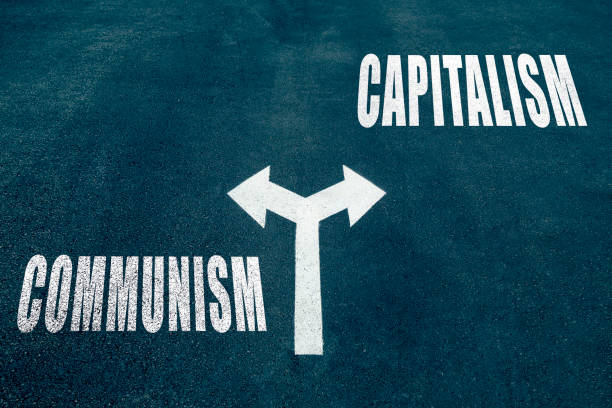
Capitalism is commonly thought of as an economic system in which private actors own and control property according to their own interests, and demand and supply freely set market prices in ways that benefit society.
The desire to make a profit is a fundamental element of capitalism. Capital assets, such as factories, mines, and railroads, can be privately owned and controlled in a capitalist economy, labour can be bought for money salaries, capital profits accrue to private owners, and prices allocate capital and labour between competing uses.
The system may appear simple in principle, but it is far more difficult in practice and can have both positive and negative consequences. Here’s how capitalism works, as well as the benefits and drawbacks of the economic system.
What Is Capitalism?
Owners with capitalistic ownership control the factors of production and profit from their ownership. This allows them to run their businesses more efficiently. It also gives them the incentive to make the most money possible.
To succeed, capitalism necessitates a free market economy. It distributes products and services according to supply and demand laws. According to the law of demand, when demand for a product increases, so does its price. Competitors increase production when they realise they can make a larger profit. As a result of the increased supply, prices have fallen to the point where only the top competitors remain.
Read: How to Create a Budget for Your New Business
How Capitalism works
Supply owners compete against one another for the largest profit margin. They sell their products at the greatest feasible price while keeping their overhead minimal. Although competition keeps prices low and production efficiency, it can also lead to worker exploitation and terrible working conditions, particularly in nations where labour rules are lax.
The unrestricted operation of capital markets is another aspect of capitalism. Stocks, bonds, derivatives, money, and commodities are all priced according to supply and demand laws. Capital markets enable businesses to raise capital for expansion.
The role of the government is to safeguard the free market. It should prevent monopolies or oligarchies from gaining undue advantages. It should prevent information from being manipulated and ensure that it is disseminated fairly.
Advantages of Capitalism
Because consumers will pay more for what they desire the most, capitalism produces the best things at the best pricing. Firms give what customers want at the greatest prices they’ll pay, but prices are constrained by competition among businesses, which strive to provide items as efficiently as possible in order to maximise profit.
Capitalism’s inherent reward for innovation, such as new goods and more efficient production methods, is critical for economic progress. Steve Jobs, a co-founder of Apple Computer Inc., famously stated, “We aim to stay ahead of consumer wants.” “You can’t simply ask customers what they want and then try to deliver it. They’ll want something fresh by the time you finish it.”
Disadvantages of Capitalism
Those who lack competitive skills, such as the elderly, youngsters, the developmentally challenged, and caregivers, are left out of capitalism. Capitalism requires government policies that prioritise the family unit in order for society to function.
Capitalism does not foster equality of opportunity, despite the idea of a level playing field. Those who lack proper nutrition, support, and education may never make it to the playing field, and society will never reap the benefits of their valuable skills. Those who do find jobs may confront low pay, restricted opportunities for promotion, and potentially hazardous working conditions. In the near term, this inequality may appear to be in the winners’ best interests.
They face less competitive threats and may be able to manipulate the system by erecting entry barriers. For example, give to political politicians who favour legislation that benefits their industries. They could send their children to private schools while supporting lower taxes and public school funding.
Capitalism vs. Socialism

Socialists claim that their system evolved from capitalism. It enhances it by establishing a direct link between citizens and the goods and services they desire. The factors of production are owned by the people as a whole, not by individual business owners.
Oil, gas, and other energy-related corporations are owned by many communist regimes. Controlling these lucrative industries is strategic for a government. Instead of corporate taxes, the government takes the earnings from a private oil business. These revenues are distributed through government expenditure programmes. In the global economy, these state-owned businesses compete with private businesses.
Capitalism vs. Communism

Communism is a type of socialism in which the means of production, resources, and property are owned and governed equally by the egalitarian society, i.e. the community. It is based on the shared ownership concept. The essential premise of communism is that each person’s contribution and share are determined by his or her skills and requirements.
The government controls everything in this political system, and everyone works toward a single objective. As a result, there is no class division because everyone is treated equally. The goal of communism is to close the gap between rich and poor people and achieve economic equality.
Reasons Why Capitalism Is Loved
1. Capitalism promotes freedom
The ability to make decisions is the most fundamental freedom. Capitalism encourages people to make their own decisions. It encourages people to make their own decisions about what they want to buy, how much they want to spend, where they want to live, work, and so on. Choices are limited under statism. For example, the government determines what type of light bulb is accessible, how much water a toilet can use, and the minimum industrial efficiency of an air conditioning system, among other things.
2. Social contribution
It is a fallacy to believe that capitalists lack a social conscience and that socialism — and charity — are the only ways to ensure social goodness. There are numerous businesses that function under capitalism and make major contributions to society. The Newman’s Own firm is an obvious example. While the company’s profits are donated to charity, the company’s management and staff are highly compensated for their efforts. Other employees and businesses also contribute to the greater good. Hairdressers, too, play a role in a person’s happiness. Governments run initiatives to assist residents who are less fortunate. And tech behemoths play a significant role in the labour market by financing job training and hiring newly graduated college students.
3. Healthy competition
Healthy competition is one of capitalism’s most important advantages. Everyone benefits from competition. When businesses compete for customers, they are obliged to offer a wider range of services or expand their services, as well as provide better customer service. Growth is aided by competition. It motivates a corporation to look for ways to develop, not rest on its laurels, and strive for greater success. Human nature necessitates competition. There will be intrinsic rivalry in all people undertake as long as humans compare themselves to others. In this manner, capitalism is part of what it means to be human.
4. Ownership and opportunity
With capitalism, you can possess something, such as land, and transform it into an opportunity, such as a farm, a rental property, or even an oil field if the conditions are favourable. Capitalism is characterised by ownership and opportunity. The future is significantly hampered without them.
There are so many advantages to capitalism that it’s hard to name them all. We live in a capitalist society, which means you have the ability to pick who you work with.
The Bottom Line
In actuality, most countries and economies are somewhere in between capitalism and socialism/communism. To counter the shortcomings of both systems, several countries combine the private sector system of capitalism with the public sector business system of socialism. Mixed economies are the term used to describe these countries. In these economies, the government intervenes to prevent monopolistic behaviour and inappropriate concentration of economic power by any individual or firm. Both the state and individuals may own resources in these systems.
Before you go…
Hey, thank you for reading this blog to the end. I hope it was helpful. Let me tell you a little bit about Nicholas Idoko Technologies. We help businesses and companies build an online presence by developing web, mobile, desktop and blockchain applications.
As a company, we work with your budget in developing your ideas and projects beautifully and elegantly as well as participate in the growth of your business. We do a lot of freelance work in various sectors such as blockchain, booking, e-commerce, education, online games, voting and payments. Our ability to provide the needed resources to help clients develop their software packages for their targeted audience on schedule.
Be sure to contact us if you need our services! We are readily available.
[E-Books for Sale]
1,500 AI Applications for Next-Level Growth: Unleash the Potential for Wealth and Innovation
$5.38 • 1,500 AI Applications • 228 pages
Are you ready to tap into the power of Artificial Intelligence without the tech jargon and endless guesswork? This definitive e-book unlocks 1,500 real-world AI strategies that can help you.
See All 1,500 AI Applications of this E-Book
750 Lucrative Business Ideas: Your Ultimate Guide to Thriving in the U.S. Market
$49 • 750 Business Ideas • 109 pages
Unlock 750 profitable business ideas to transform your future. Discover the ultimate guide for aspiring entrepreneurs today!
Put Your Tech Company on the Map!
Get featured on Nicholas Idoko’s Blog for just $50. Showcase your business, boost credibility, and reach a growing audience eager for tech solutions.
Publish NowSee All 750 Business Ideas of this E-Book
500 Cutting-Edge Tech Startup Ideas for 2024 & 2025: Innovate, Create, Dominate
$19.99 • 500 Tech Startup Ideas • 62 pages
You will get inspired with 500 innovative tech startup ideas for 2024 and 2025, complete with concise descriptions to help you kickstart your entrepreneurial journey in AI, Blockchain, IoT, Fintech, and AR/VR.
We Design & Develop Websites, Android & iOS Apps
Looking to transform your digital presence? We specialize in creating stunning websites and powerful mobile apps for Android and iOS. Let us bring your vision to life with innovative, tailored solutions!
Get Started Today



